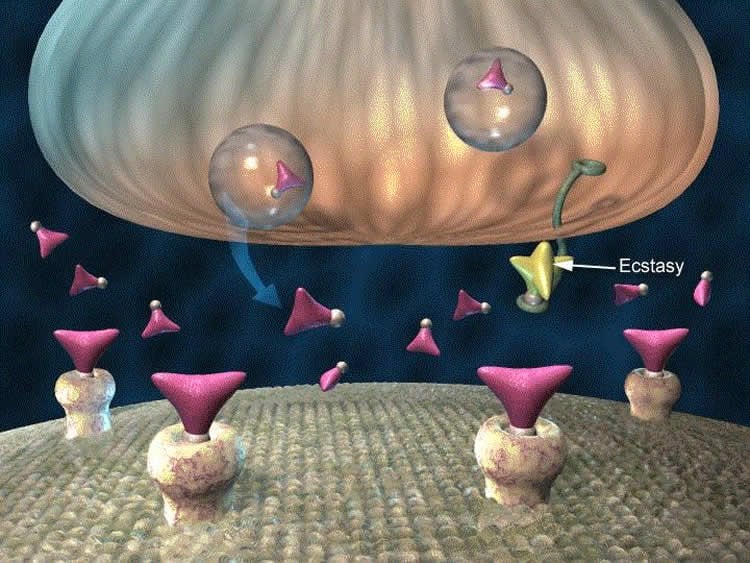Summary: Researchers call for a rigorous scientific exploration of MDMA’s effects to identify precisely how the drug works, the data from which could be used to develop therapeutic compounds.
Source: Cell Press.
MDMA, more commonly known as ecstasy, promotes strong feelings of empathy in users and is classified as a Schedule 1 drug–a category reserved for compounds with no accepted medical use and a high abuse potential. But in a Commentary published July 14 in Cell, two researchers call for a rigorous scientific exploration of MDMA’s effects to identify precisely how the drug works, the data from which could be used to develop therapeutic compounds.
“We’ve learned a lot about the nervous system from understanding how drugs work in the brain–both therapeutic and illicit drugs,” says Robert Malenka, a psychiatrist and neuroscientist at Stanford University. “If we start understanding MDMA’s molecular targets better, and the biotech and pharmaceutical industries pay attention, it may lead to the development of drugs that maintain the potential therapeutic effects for disorders like autism or PTSD but have less abuse liability.”
MDMA is described as an “empathogen,” a compound that promotes feelings of empathy and close positive social feelings in users. The drug is a strictly regulated Schedule I compound, along with drugs such as heroin and LSD. However, MDMA’s regulated status shouldn’t discourage researchers from studying its effects, argue Malenka and coauthor Boris Heifets, also at Stanford.
Researchers still don’t know exactly how MDMA works in humans, what regions of the brain it targets, or all of the molecular pathways it affects. Malenka and Heifets don’t condone the drug’s recreational use, but say that scientific study to uncover its mechanisms could help explain fundamental workings of the human nervous system–including how and why we experience empathy. Early clinical cases and a small trial in 2013 also showed some use for MDMA as a treatment during therapy for patients with PTSD, possibly aiding patients in forming a stronger bond with a therapist.
“Studying the response of the brain and nervous system to any drug is no different than running an animal through a maze and asking how learning and memory work, for example,” Malenka says. “You’re trying to understand the different mechanisms of an experience. Drugs like MDMA should be the object of rigorous scientific study, and should not necessarily be demonized.”

The advent of tools over the last decade such as optogenetics, viral tracing methodologies, sophisticated molecular genetic techniques, and the ability to create knockout mice have contributed to the push for more research into MDMA. “I started thinking five or six years ago that maybe we can actually attack how MDMA works in the brain in a more meaningful way, because now we have the tools to do it right,” says Malenka.
Malenka’s team has already begun preliminary studies to test MDMA’s effects in mice, and is writing a proposal to the National Institute on Drug Abuse for a larger project in concert with researchers who plan to tackle the human aspects of the study. Studies using MDMA have to go through many rounds of paperwork and follow stringent safety measures to get approval, but Malenka’s message is clear: it’s worth it.
“There are going to be certain areas of the brain in which MDMA’s actions are critical for its behavioral effects,” says Malenka. “You can give it to human beings under appropriately controlled, carefully monitored clinical conditions and do fMRI and funcational connectivity studies, and you can begin to build up a knowledge base in an iterative fashion, combining the animal and human studies, where we start to gain more traction in understanding its neural mechanisms.”
Source: Joseph Caputo – Cell Press
Image Source: This NeuroscienceNews.com image is in the public domain. Credit: NIDA.
Original Research: Full open access research for “MDMA as a Probe and Treatment for Social Behaviors” by Boris D. Heifets, and Robert C. Malenka in Cell. Published online July 14 2016 doi:10.1016/j.cell.2016.06.045
[cbtabs][cbtab title=”MLA”]Cell Press. “Why Scientists are Calling for Experiments on Ecstasy.” NeuroscienceNews. NeuroscienceNews, 14 July 2016.
<https://neurosciencenews.com/ecstasy-resarch-neuroscience-4684/>.[/cbtab][cbtab title=”APA”]Cell Press. (2016, July 14). Why Scientists are Calling for Experiments on Ecstasy. NeuroscienceNew. Retrieved July 14, 2016 from https://neurosciencenews.com/ecstasy-resarch-neuroscience-4684/[/cbtab][cbtab title=”Chicago”]Cell Press. “Why Scientists are Calling for Experiments on Ecstasy.” https://neurosciencenews.com/ecstasy-resarch-neuroscience-4684/ (accessed July 14, 2016).[/cbtab][/cbtabs]
Abstract
MDMA as a Probe and Treatment for Social Behaviors
MDMA, better known as the recreational drug “ecstasy,” is well known for stimulating a feeling of closeness and empathy in its users. We advocate that exploring its mechanism of action could lead to new treatments for psychiatric conditions characterized by impairments in social behavior.
“MDMA as a Probe and Treatment for Social Behaviors” by Boris D. Heifets, and Robert C. Malenka in Cell. Published online July 14 2016 doi:10.1016/j.cell.2016.06.045






